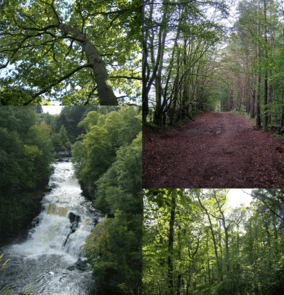Clyde Valley Woodlands National Nature Reserve
| Clyde Valley Woodlands National Nature Reserve | |
|---|---|
|
Clockwise, from top left: 1) an oak tree at Cartland Craigs; 2) one of the walkways at Chatelherault; 3) dense woodland at Cleghorn Glen; 4) Corra Linn within the Falls of Clyde. | |
| Location | South Lanarkshire, Scotland, United Kingdom |
| Nearest city | Carluke, Hamilton, Lanark and Lesmahagow |
| Established |
1981: Cleghorn Glen is declared a National Nature Reserve 1987: Cartland Craigs is declared part of the reserve, forming the Clyde Valley Woodlands National Nature Reserve 2007: Chatelherault, Falls of Clyde, Mauldslie Woods and Nethan Gorge are declared parts of the Clyde Valley Woodlands National Nature Reserve[1] |
| Governing body |
Scottish Natural Heritage Scottish Wildlife Trust South Lanarkshire Council |
| http://www.nnr-scotland.org.uk/clyde-valley-woodlands/ | |
The Clyde Valley Woodlands National Nature Reserve is a nature reserve made up of six separate sites in the Clyde Valley region of South Lanarkshire, Scotland. Those sites are Cartland Craigs (known locally as Cartland Crags), Chatelherault, Cleghorn Glen, Falls of Clyde, Mauldslie Woods and Lower Nethan Gorge.
Five of the six sites, located in and around the towns of Lanark, Lesmahagow and Hamilton, are designated Sites of Special Scientific Interest because of the abundance of native woodland found within them, as well as other rare flora. Mauldslie Woods near Carluke has been described as an experimental addition to the National Nature Reserve and has no other official designation. Some endangered species also exist within the sites. The most prime example is the Falls of Clyde, in which there are endangered peregrine falcons and rare tundra plant life that has survived on a cliff face since the last Ice Age.[2]
History
The reserve's history began 10,000 years ago when melting glaciers began eroding the red sandstone in the area, forming the valleys and gorges that make up the reserve.[1]
Sites
Six sites make up the Clyde Valley Woodlands National Nature Reserve.
Cartland Craigs
Cartland Craigs is a site of special scientific interest on the outskirts of Lanark and the village of Cartland. It is owned wholly by Scottish Natural Heritage. It is home to several rare species of animal, including roe deer, badgers and red squirrel, as well as the remains of Castle Qua,[3] a medieval structure.
Mouse Water, a tributary of the River Clyde, runs through the site.
Chatelherault
Cleghorn Glen
Falls of Clyde
The Falls of Clyde are a collection of four waterfalls along the river Clyde, near the villages of New Lanark and Stonebyres. However, only the three falls near New Lanark (Bonnington Linn, Corra Linn and Dundaff Linn) are included in the Falls of Clyde site of special scientific interest, with the other, Stonebyres Linn, being approximately 2 miles further downstream.
Scottish Wildlife Trust, a charitable organisation, manages the Falls of Clyde site, focusing on the preservation of the endangered or protected wildlife on the grounds, such as peregrine falcons, roe deer and badgers.[4] As well as this fauna, there is a great deal of interesting, protected and rare plant life to be found within the Falls of Clyde. For example, there are fields of heather, rowan, bluebells and the slopes of the natural amphitheatre beneath Corra Linn are home to a rare tundra plant life which has survived since the last ice age. There also exists a large variety of native woodland on the site. Much of Scotland's native woodland has been destroyed or replaced with exotic trees by human activity.
Within the Falls of Clyde there is an abundance of architecture, including Bonnington Pavilion,[5] an 18th-century house of mirrors, an iron footbridge[6] and the 15th-century Corra Castle, all of which are in ruins.[7][8]
Mauldslie Woods
Nethan Gorge
References
- 1 2 "The Story of the Clyde Valley Woodlands National Nature Reserve" (PDF). Scotland's National Nature Reserves. Scottish National Heritage. 2010. Retrieved 21 January 2012.
- ↑ "Natural Heritage Site Corra Linn". trivago.co.uk. trivago GmbH. 6 December 2011. Retrieved 19 January 2012.
- ↑ "Site Record for Castle Qua". CANMORE. Royal Commission on the Ancient and Historical Monuments of Scotland. Retrieved 22 January 2012.
- ↑ "Falls of Clyde reserve". Scottish Wildlife Trust. Retrieved 22 January 2012.
- ↑ "Site Record for Bonnington Pavilion". CANMORE. Royal Commission on the Ancient and Historical Monuments of Scotland. Retrieved 22 January 2012.
- ↑ "Site Record for Bonnington Linn, Foot Bridge". CANMORE. Royal Commission on the Ancient and Historical Monuments of Scotland. Retrieved 22 January 2012.
- ↑ "Site Record for Corra Castle". CANMORE. Royal Commission on the Ancient and Historical Monuments of Scotland. Retrieved 22 January 2012.
- ↑ "Fall for nature in New Lanark" (PDF). Scottish Wildlife Trust. 24 October 2011. Retrieved 22 January 2012.

